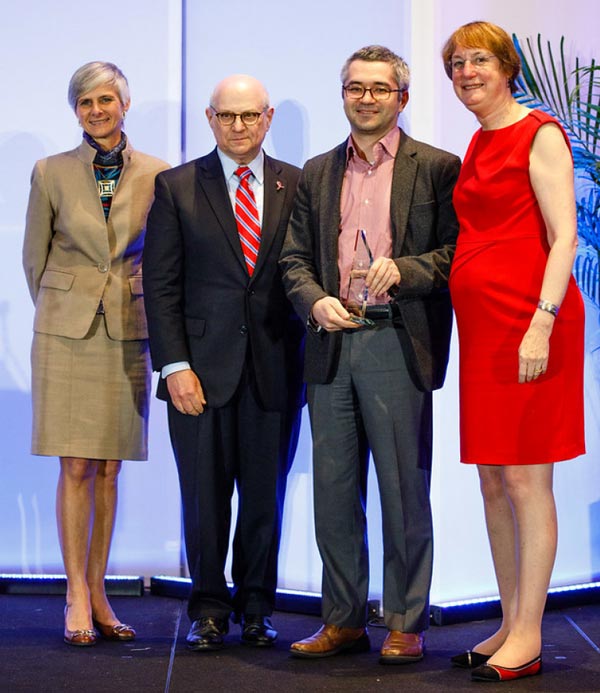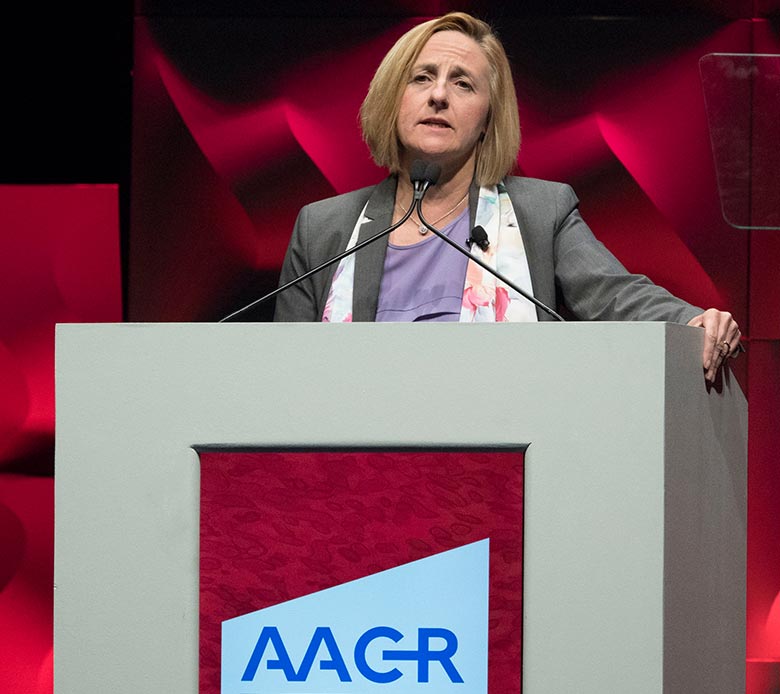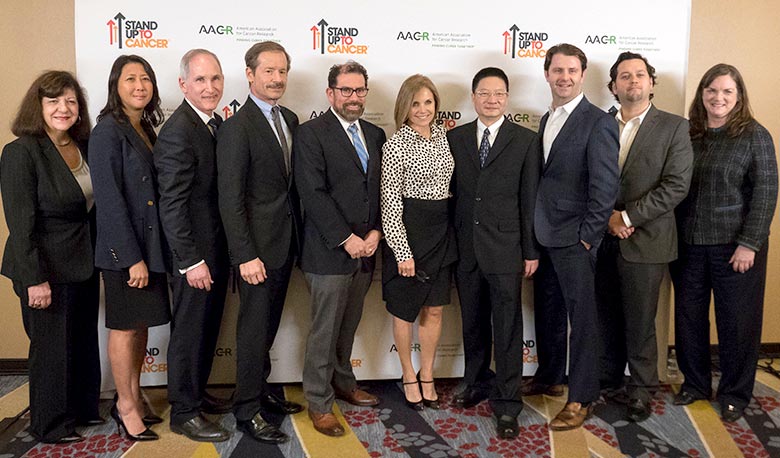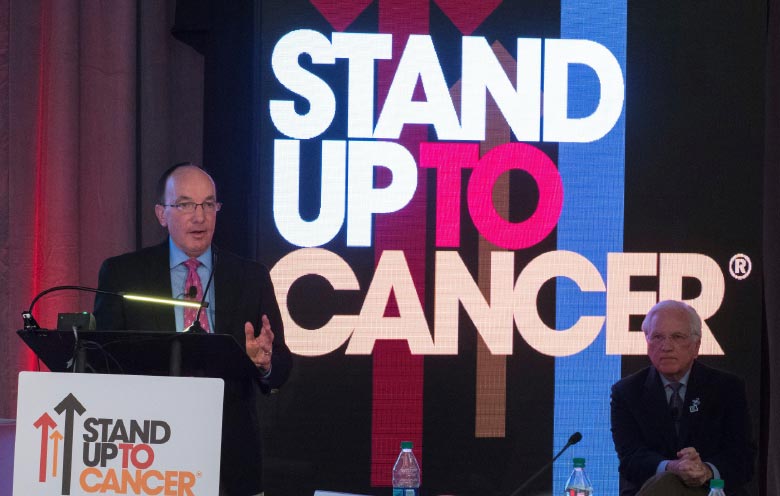Supporting Advances in Cancer Science
In 1993, the AACR partnered with Glaxo Wellcome Co. to develop its first grant, the AACR Gertrude B. Elion Cancer Research Award. Named for Gertrude B. Elion—Nobel Laureate, Scientist Emeritus at Glaxo Wellcome Co., and AACR Past President—this inaugural funding program identified, encouraged, and supported promising tenure-eligible junior faculty, demonstrating the AACR’s commitment to fostering the pipeline of cancer researchers.
For more than 20 years, the AACR has continued to partner with generous funders to support groundbreaking basic, translational, and clinical cancer research, awarding nearly 600 grants to meritorious investigators in 11 countries around the world. In 2017, the AACR expanded the grants program to respond to changes in the field, establishing Cancer Interception Research Fellowships to foster this emerging area of research.
582
Grants have been awarded by the AACR since 1993; these grants supported research across the spectrum of cancer science, including basic (29%), translational (53%), and clinical research (18%).
47
Scientists were funded by AACR grants in 2017; these investigators received more than $6.3 million to support work in all areas of cancer research.
6
Early-career scientists were funded through the AACR’s expanded Immuno-oncology grants program.
$2.3 million
Was awarded to postdoctoral and clinical fellows, providing critical resources to support the career development of the next generation of cancer scientists.
$2.2 million
Was awarded through partnerships with the pharmaceutical industry, including a renewed partnership with AstraZeneca.
AACR-Awarded Grant Amounts by Year
1993
$30,000
1995
$30,000
2000
$430,000
2005
$2,150,000
2010
$4,253,750
2015
$8,201,000
2017
$6,320,000

$1.8 million
Was awarded to the second class of recipients of the AACR NextGen Grants for Transformative Cancer Research—including the Breast Cancer Research Foundation-AACR NextGen Grant for Transformative Cancer Research, a new grant given in the name of AACR President Nancy E. Davidson, MD, FAACR.
The AACR and Stand Up To Cancer: Partners in Innovation
The AACR proudly serves as the Scientific Partner of Stand Up To Cancer (SU2C), a program of the Entertainment Industry Foundation that supports groundbreaking translational cancer research in order to bring new therapies to patients more quickly. SU2C achieves this goal through novel funding models that promote collaborative science and encourage innovative ideas. The AACR supports these models by providing expert scientific peer review and grants administration, ensuring that SU2C’s investment in research has the greatest benefit for cancer patients.
Dream Team Approaches Bring Hope to Childhood Cancer Patients
A key component of SU2C’s mission is to bring new therapies to patients in the shortest possible time. The pursuit of that mission yielded encouraging results in 2017. In July, the FDA approved a groundbreaking chimeric antigen receptor (CAR) T-cell therapy for relapsed or refractory leukemia in children and young adults, validating an approach taken by the SU2C-St. Baldrick’s Foundation Pediatric Cancer Dream Team. Since its founding in 2013, the Dream Team—under the guidance of Leader John Maris, MD, and Co-leader Crystal Mackall, MD (right)—has played a key role in the development of CAR T therapy. The team also developed a standardized approach to the management of cytokine release syndrome (CRS)—the most serious side effect of CAR T-cell treatment—which will expand the use of this emerging treatment to more children and young adults with leukemia.
New Research Teams
One key way that SU2C accelerates the translation of discoveries to treatments is team science. By incentivizing collaboration, SU2C-funded teams bring together the greatest minds in cancer research and focus them on the critical challenges in cancer research. As the Scientific Partner of SU2C, the AACR provides scientific leadership, expert peer review, scientific oversight, and grants administration to keep these teams focused on their goals. With the assistance of its Scientific Advisory Committee (SAC), led by Nobel Laureate Phillip A. Sharp, PhD, FAACR, SU2C identified and funded the following teams in 2017:
Cancer Interception Teams. SU2C showcased its support of groundbreaking ideas in cancer treatment in 2017 by funding new research teams focused on a radical new approach known as “cancer interception.” Proposed in 2001 by Elizabeth H. Blackburn, PhD, FAACR, a Nobel Laureate and AACR Past President, cancer interception involves finding cancer or pre-cancerous activity at its earliest stages, when treatment is more likely to be successful. The initial call for proposals centered on lung and pancreatic cancer, which are among the most difficult to treat because they are typically diagnosed at later stages. In response to the large number of excellent proposals received—and thanks to the generosity of SU2C’s funding partners—the Scientific Advisory Committee created a total of four research teams with grants totaling $14.6 million:

Colorectal Cancer Dream Team
Leader: Luis Diaz, MD (fifth from left)
Co-leaders: Lewis C. Cantley, PhD, FAACR (fourth from left), Charles S. Fuchs, MD, MPH (third from left), and Zhenghe Wang, PhD (fourth from right)
This Dream Team will explore the potential of immunotherapy and targeted therapy to transform the treatment of colorectal cancer, one of the leading causes of cancer-related death in the United States. The team’s research program will also include clinical trials to investigate drugs that could attack genetic vulnerabilities in many types of colorectal cancer tumors.
Stand Up To Cancer-Lustgarten Foundation Chimeric Antigen Receptor
T Cell (CAR T) Translational Research Team
Leader: Carl June, MD, FAACR
Co-leaders: Shelley L. Berger, PhD, and E. John Wherry, PhD
The goal of this Translational Research Team is to adapt CAR T-cell therapy—which recently received FDA approval for the treatment of leukemia but which has proven less effective thus far in solid tumors—for application to pancreatic cancer. The study will include an epigenetic analysis of patients participating in phase I trials. The team leaders hope to identify the epigenetic changes that are common in the patients that respond to the treatment and in the patients that do not respond—and to use the knowledge of those patterns to identify and address the mechanisms of resistance.
SU2C Catalyst®: More Collaboration, Better Combinations
Launched at the AACR Annual Meeting 2016, the SU2C Catalyst® program establishes a unique collaboration between industry and academic scientists to accelerate the pace of groundbreaking translational research. The program—which is administered by the AACR—provides investigators with medicines, materials, and funding donated by pharmaceutical, biotechnology, diagnostic, and medical device companies and encourages them to develop new uses for and new combinations of those resources to benefit cancer patients.
In October, SU2C awarded the first 10 SU2C Catalyst® clinical trial projects to research teams composed of investigators from more than 30 institutions. The Charter Supporters of the program—founding collaborator Merck, Bristol-Myers Squibb Company, and Genentech—donated new pharmaceutical compounds to the teams, along with approved agents that can be investigated for other uses. The clinical trials conducted by the Catalyst program participants will explore new uses for these therapies and new combinations with products from six other participating companies. Under the direction of the team leaders, the trials will address the following types of cancer:
Merck-supported Projects
Bristol-Myers Squibb-supported Projects
Genentech-supported Projects
High Risk, High Impact: 2017 Innovative Research Grants for Immuno-Oncology
SU2C expanded its support of young investigators with new ideas in 2017 by awarding 10 new Innovative Research Grants. These grants provide significant support to early-career scientists, empowering them to pursue research projects that challenge existing paradigms. With the support of industry partner Bristol-Myers Squibb, SU2C distributed $7.5 million in grants to support 10 projects that aspire to bring the benefits immuno-oncology to an increasing number of patients.
Annual SU2C Scientific Summit: Patient Perspective
Another unique element of SU2C’s team-based funding model is the inclusion of patient advocates on the project teams. These team members provide a critical patient perspective on the treatments being developed while also reminding the scientific participants that improving the lives of patients is the ultimate goal of their research projects. This patient focus was in evidence at the annual SU2C Scientific Summit. The Summit—which was organized by the AACR—gathers the entire SU2C community to provide updates on the status of SU2C-funded research projects and explore additional possibilities for collaboration among the scientific teams. For the first time, patient advocates joined their scientific colleagues in addressing the Summit attendees.

Stu Rickerson (far right), a 12-year survivor of pancreatic cancer who serves on the SU2C-Lustgarten team, and Patrick Gavin (near right), a survivor of three types of cancer who is a member of the VARI-SU2C Epigenetics Dream Team, delivered a presentation on improving participation in clinical trials and simplifying the process of securing informed consent. While they provided a valuable perspective on the logistical challenges of delivering new treatments, these patient advocates also inspired the scientists, clinicians, industry partners, and funders to redouble their efforts on behalf of all cancer patients.
